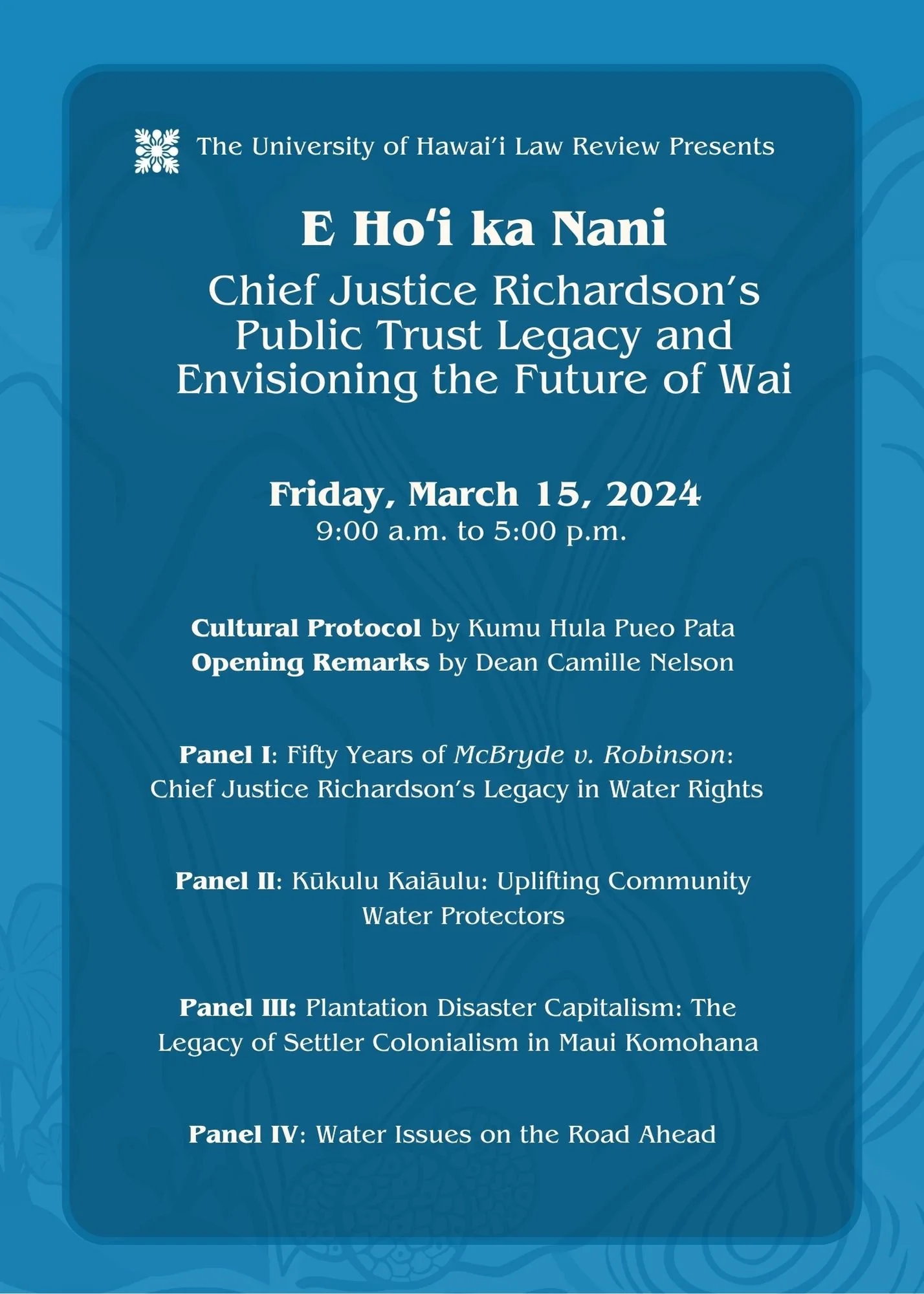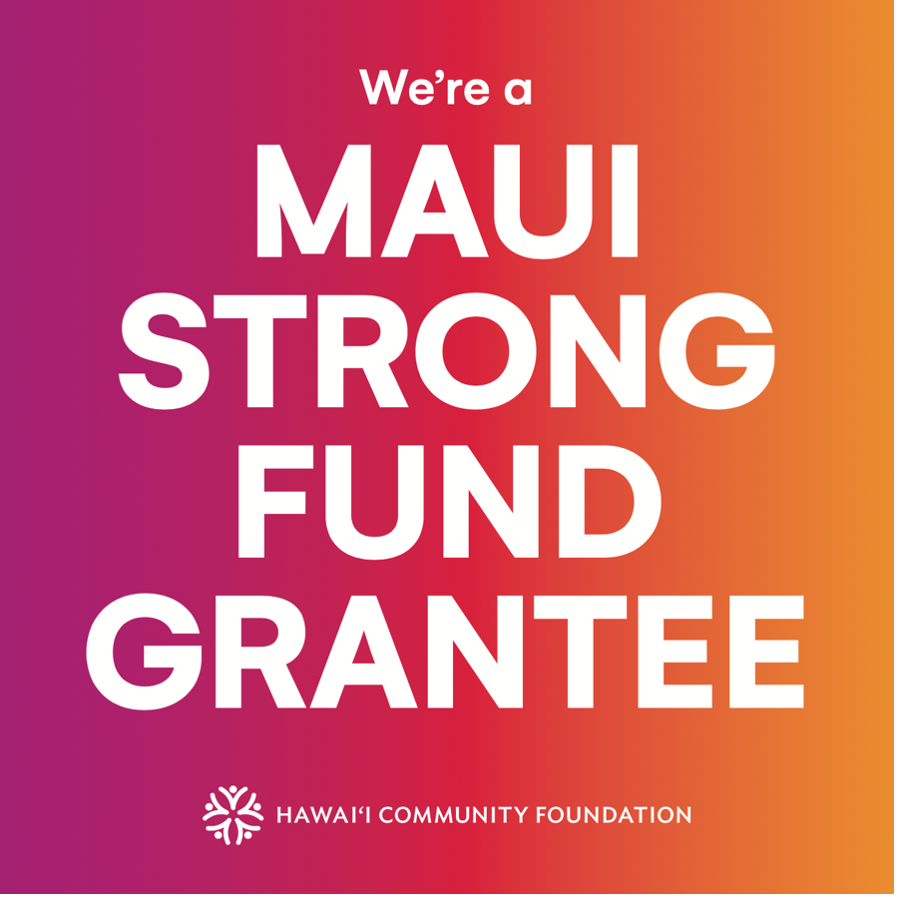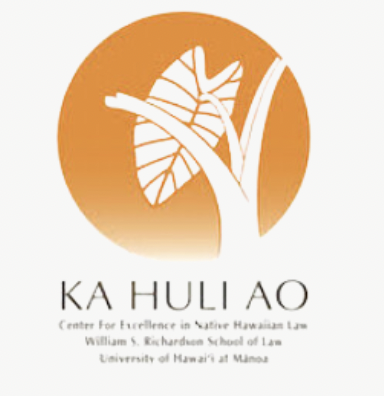On March 15, 2024, the University of Hawaiʻi Law Review hosted its Spring Symposium titled E Hoʻi ka Nani: Chief Justice Richardson's Public Trust Legacy and Envisioning the Future of Wai. At this event, water experts, community leaders, and legal scholars came together to discuss the power and potential of the public trust to shape Hawaiʻi’s water future, especially in light of Maui’s recovery from the devastating August 2023 wildfires.
Recordings of each panel is available on our Youtube channel:
E Hoʻi ka Nani: Chief Justice Richardson’s Public Trust Legacy and Envisioning the Future of Wai
Cultural Protocol by Kumu Pueo Pata
Opening Remarks by Dean Camille Nelson
Scheduled Time: 9:30 AM to 10:00 AM
Panel I - Fifty Years of McBryde v. Robinson: Chief Justice Richardson’s Legacy in Water Rights
Scheduled Time: 10:00 AM to 11:00 AM
CLE Credits: 1
In McBryde v. Robinson, the Hawaiʻi Supreme Court, led by Chief Justice Richardson, held that the State of Hawaiʻi holds all water in trust for the benefit of the larger community. The court arrived at its decision through an application of the Public Trust Doctrine, informed by Native Hawaiian concepts of land use and resource management. Chief Justice Richardson went on to clarify and expand upon legal protections for freshwater in the subsequent decisions Robinson v. Ariyoshi and Reppun v. Board of Water Supply. This panel endeavors to accomplish two things: (1) set the legal and legislative foundation for future panels; (2) critically analyze the impacts of Chief Justice Richardson’s jurisprudence on more recent Hawaiʻi water law and beyond.
Moderator: Professor Melody K. MacKenzie
Panelists: Justice Richard Pollack, Isaac Moriwake, and Professor Williamson B.C. Chang
Panel II - Kūkulu Kaiāulu: Uplifting Community Water Protectors
Scheduled Time: 11:00 AM to 12:30 PM
CLE Credits: 1.5
This panel aims to center on and uplift community voices and water protectors with a focus on base building and cross-community communication. Leaders of different generations will share strategies and lessons learned from their ongoing water rights battles. Where Panel I traces the evolution of the legal doctrine, Panel II traces the moʻokūʻauhau (genealogy) of kiaʻi wai (water protectors) exercising their rights to water on the ground.
Moderator: Kaulu Luʻuwai
Panelists: Hōkūao Pellegrino, Paul Reppun, and Kanoe Steward
Panel III - Plantation Disaster Capitalism: The Legacy of Settler Colonialism in Maui Komohana
Scheduled Time: 1:30 PM to 3:00 PM
CLE Credits: 1.5
This panel will attempt to shed light on a harsh reality: dominant interests in water rights are still tied to colonial forces. In light of the recent Maui fires, legal scholars have categorized certain actions by the development community and the Governor’s administration as a form of “disaster capitalism.” This panel will discuss the impacts of this exact legacy of settler colonialism, resulting from over a century of plantation water diversion, exacerbated by the impacts of global climate change.
Moderator: Professor D. Kapuaʻala Sproat
Panelists: Elena Bryant, Kekai Keahi, and Wayne Tanaka
Panel IV - Water Issues on the Road Ahead
Scheduled Time: 3:00 PM to 4:30 PM
CLE Credits: 1.5
The final panel will highlight some of the major challenges to freshwater management in Hawaiʻi that lawmakers, administrators and community members can expect to face in the near future. This panel will begin the process of understanding how the Public Trust Doctrine can be leveraged to achieve resource equity and climate resilience in our communities across Hawaiʻi. Specific attention will be given to the water policy decisions that are critical to Maui Komohana’s recovery. We envision this panel to be forward-looking, hopeful, and promising.
Moderator: Holly Doyle
Panelists: Nāʻālehu Anthony, Kaipo Kekona, and Dr. Jonathan Scheuer








